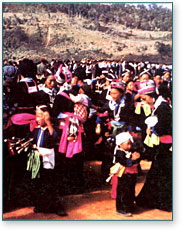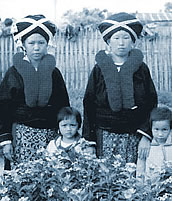Continued
from page 1
The Iu-Mien and Hmong served in the U.S.-supported Royal Laotian Army and government, which also fought against communist forces during the concurrent civil war in Laos. By the end of the Vietnam War, about one third of the Hmong population had died; half of males older than fifteen years of age had been killed. These ethnic groups were then abandoned by the Americans and executed or imprisoned in “re-education camps” by the new regime, the Pathet Lao (Lao Communist) government of the Lao People’s Democratic Republic. Tens of thousands died of starvation or were massacred as they tried to escape. Those who survived the reprisals by the enemy trekked through the jungle to refugee camps in Thailand. They were then processed to Australia, Argentina, Canada, Germany, France, French Guyana, New Zealand, and the United States.
 As self-sufficient farmers who were pre-literate, both groups face high levels of poverty and unemployment in the United States. Some who were originally settled in urban areas have moved to rural areas such as central California and North Carolina, where land is more affordable and they can use their skills as farmers. Others work in service sector or assembly production jobs. Given their participation in the war and subsequent persecution, many suffer from mental health and medical problems. As self-sufficient farmers who were pre-literate, both groups face high levels of poverty and unemployment in the United States. Some who were originally settled in urban areas have moved to rural areas such as central California and North Carolina, where land is more affordable and they can use their skills as farmers. Others work in service sector or assembly production jobs. Given their participation in the war and subsequent persecution, many suffer from mental health and medical problems.
Accepting the Hmong and Iu-Mien into the U.S. for refugee resettlement meant revealing America’s secret war in Laos, which had been kept a secret from the U.S. public. As a result, they were not rendered the immediate assistance given to the Vietnamese. Even though many are veterans who fought alongside U.S. soldiers and suffered immeasurable hardships because of this alliance, they and their families are not given veterans’ benefits or recognition for their valor. They have had to struggle for fair compensation for social services and medical care, which is provided based on their status as political refugees rather than as U.S. veterans. Many Americans still do not know of their military contributions as U.S. allies and, as a result, continue to question their presence in the U.S. and resent the services provided to them.
|


 As self-sufficient farmers who were pre-literate, both groups face high levels of poverty and unemployment in the United States. Some who were originally settled in urban areas have moved to rural areas such as central California and North Carolina, where land is more affordable and they can use their skills as farmers. Others work in service sector or assembly production jobs. Given their participation in the war and subsequent persecution, many suffer from mental health and medical problems.
As self-sufficient farmers who were pre-literate, both groups face high levels of poverty and unemployment in the United States. Some who were originally settled in urban areas have moved to rural areas such as central California and North Carolina, where land is more affordable and they can use their skills as farmers. Others work in service sector or assembly production jobs. Given their participation in the war and subsequent persecution, many suffer from mental health and medical problems.